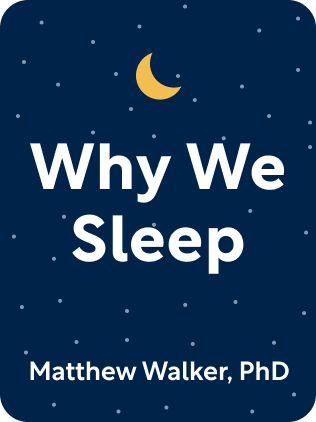

This article is an excerpt from the Shortform summary of "Why We Sleep" by Matthew Walker. Shortform has the world's best summaries of books you should be reading.
Like this article? Sign up for a free trial here .
What are the health effects of sleep deprivation? Are they serious?
The health effects of sleep deprivation on the body can be serious and varied. It’s one of the reasons it’s important to get enough sleep; health effects of sleep deprivation can be serious and unpredictable.
Health Effects of Sleep Deprivation on the Body
In addition to the damage it causes to the brain, sleep deprivation disrupts the normal function of many physiological processes, likely contributing to chronic diseases. You can read about some of the health effects of sleep deprivation below.
At a high level, sleep deprivation of even just 1-2 hours triggers the sympathetic nervous system (fight or flight response) and disrupts hormonal balances. This also implies that sleep is necessary for the normal maintenance of physiology.
Shortform Caveat
Many of the population studies cited in Why We Sleep are correlational – e.g. people who sleep less are more likely to have heart disease, after controlling for many other factors. But the causation is unclear – some other factors that predispose people to get heart disease (like a high baseline level of stress) could also reduce sleep.
To address this, the experimental studies cited attempt to link lack of sleep to a middle physiological state, which itself is causative for the disease. For instance, lack of sleep increases blood pressure, which the medical consensus believes is causative for heart disease.
Ideally, the “smoking gun” experiment would be to randomize people into normal-sleep and low-sleep groups for years, then observe the rate of disease. However, this is impractical (it’s hard to run very long studies like this and impossible to double-blind) and likely unethical (if low sleep is already believed to cause severe disease).
Diseases and Sleep Deprivation
Lack of sleep can lead to your body not being its best. Here are some issues that you could encounter.
Heart Disease
One of the health effects of sleep deprivation is heart disease. Sleep deprivation has a number of effects related to cardiovascular disease:
- It activates the sympathetic nervous system, leading to
- Increased heart rate
- Increased vasoconstriction -> increased blood pressure
- Increased cortisol (stress hormone)
- Increased atherosclerosis (esp of coronary arteries)
- Through hormone signaling, it decreases HDL (good cholesterol) and growth hormone (promotes recovery of blood vessel endothelium)
A population study showed that shorter sleep was associated with a 45% increased risk of developing heart disease.
An interesting finding: daylight savings time is a natural sleep experiment that typically increases or decreases sleep by 1 hour. When the clock moves forward and the population gets 1 less hour of sleep, there is a significant spike in heart attacks and number of traffic accidents.
Diabetes
Sleep deprivation reduces insulin responsiveness, which causes hyperglycemia.
- In an experiment, after 4 hours of sleep a night for 6 nights, subjects were 40% less effective at absorbing a standard dose of glucose.
In a population study, those sleeping < 6 hours a night showed higher rates of T2D (after controlling for body weight, alcohol, smoking, and other factors) making it one of the health effects of sleep deprivation.
Obesity, Weight Gain
As it relates to weight, sleep deprivation problems include:
- Hormonally, reduces leptin (the hormone that makes you feel full) and increases ghrelin (the hormone makes you feel hungry). It becomes harder to feel satisfied after eating.
- Increases endocannabinoids (reduces pain sensation but increases appetite; also released in runner’s high), which increases eating
- Makes you feel lethargic, which makes you less likely to exercise
- Disrupts the linkage between the rational prefrontal cortex and the primal appetite center in the brain (similar to emotional control in the last chapter), so it becomes harder to regulate your eating
In an experiment, subjects were randomized into a normal 8-hr sleep group, and a low 4-hr sleep group. Both groups were carefully monitored and controlled for physical activity.
- The low-sleep group ate 300 more calories each day, even after just 4 days of sleep deprivation.
- The low-sleep group was also more prone to overeating each meal, consuming 330 more calories in snack foods after a meal.
One might argue that decreased sleep naturally causes more calorie burn, but an all nighter actually consumes only 147 more calories than sleeping. Sleep is metabolically more intense than you might guess.
Finally, if you’re losing weight and under sleep deprivation, the shift of where you lose the weight from differs. When sleep-deprived, 70% of weight loss comes from lean body mass like muscles, compared to under 50% with plentiful sleep.
Reproductive System
In males, sleep deprivation problems include decreased testosterone, testical size, sperm count.
- Experimentally, the is acute – 5 hours of sleep for one week “ages” a man 10-15 years by testosterone
- Beyond libido, testosterone also governs bone density and muscle mass.
In females, sleep deprivation health risks include reduced follicular-releasing hormone (necessary for conception), increases abnormal menstrual cycles, and causes more issues with infertility.
Your face is rated as less attractive and less healthy after one night of short sleep. So there might be something to the idea of “beauty sleep.”
Immune System
Another of the health effects of sleep deprivation is that it weakens the immune system. Sleep deprivation reduces your ability to ward off infectious disease:
- In an experiment, subjects exposed to low sleep over 1 week were 50% likely to develop a cold when exposed to virus, vs 18% in normal-sleep
- Sleep deprivation reduces the immune response to flu vaccines by over 50%
- Sleep deprivation reduces circulating levels of natural killer cells
Cancer
Sleep deprivation health risks increases inflammation, which increases cancer severity:
- Promotes angiogenesis, or blood vessel development
- Promotes lability of cancer cells, leading to metastasis
- Downregulates M1 macrophages and upregulates M2 macrophages, both changes increasing cancer risk.
Experimental evidence:
- Experiments in mice show an increase in speed and size of cancer growth under sleep deprivation.
- Population studies show a link between nighttime shift work and risk of cancer (common occupations include nurses and pilots).
- In response, Denmark now pays worker comp to women who developed breast cancer after doing night-shift work in government-sponsored jobs
Aging
Telomeres are a component of DNA, and they get shorter with aging. Sleep deprivation problems has been shown to hasten telomere shortening, thus implying an increasing in aging.
(Shortform note: why would animals evolve so that sleep deprivation health risks are so high and causes all these bad issues? Evolutionarily, consider that these responses might promote survival: in caveman days, times of low sleep may mean conditions that threaten survival (low food stores, tough weather, hostility with another tribe). The above responses might promote short-term survival – hoarding calories, activating the “fight-or-flight” system, decreasing reproduction – at the expense of long-term well-being.)
The health effects of sleep deprivation vary depending on how a person was sleep deprived. However, it’s clear that sleep is important and the health effects of sleep deprivation are serious.

———End of Preview———
Like what you just read? Read the rest of the world's best summary of Matthew Walker's "Why We Sleep" at Shortform .
Here's what you'll find in our full Why We Sleep summary :
- Why you need way more sleep than you're currently getting
- How your brain rejuvenates itself during sleep, and why nothing can substitute for sleep
- The 11-item checklist to get more restful sleep today






